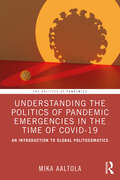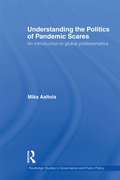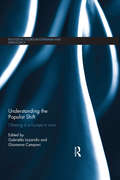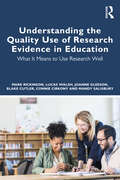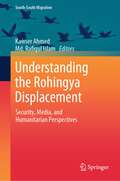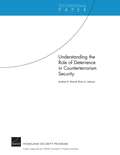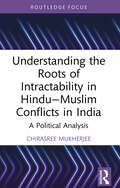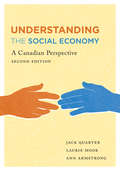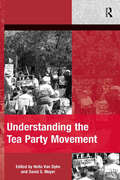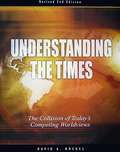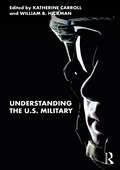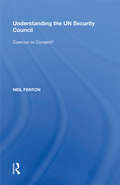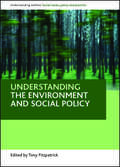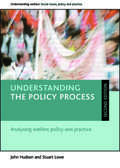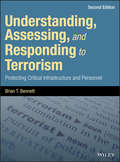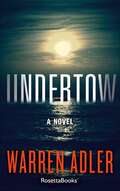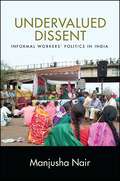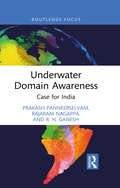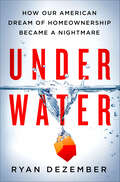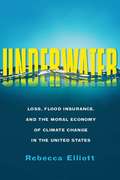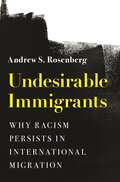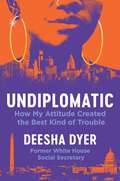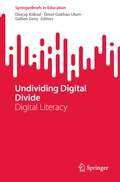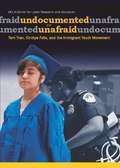- Table View
- List View
Understanding the Politics of Pandemic Emergencies in the time of COVID-19: An Introduction to Global Politosomatics (The Politics of Pandemics)
by Mika AaltolaThis book reviews the political significance of COVID-19 in the context of earlier pandemic encounters and scares to understand the ways in which it challenges the existing individual health, domestic order, international health governance actors, and, more fundamentally, the circulation-based modus operandi of the present world order. It argues that contagious diseases should be regarded as complex open-ended phenomena with various features and are not reducible merely to biology and epidemiology. They are, as such, fundamentally politosomatic, namely that they disrupt, agitate, and trigger large-scale processes because individual somatic-level anxieties stem from individuals’ sensing immediate danger through the networks of their local and global connectedness. The author further argues that pandemics have somatic effects in political expressions that transform the epidemic into national security dramas which should not, for the sake of efficient health governance, be treated as aspects extraneous to the disease itself. The book highlights that when a serious infectious disease spreads, a 'threat' is very often externalized into a culturally meaningful 'foreign' entity. Pandemics tend to be territorialized, nationalized, ethnicized, and racialized. This book will be of key interest to scholars and students of global health and governance, pandemic security, epidemics, history of medicine, geopolitics, international relations, and general readers interested in the COVID-19 pandemic.
Understanding the Politics of Pandemic Scares: An Introduction to Global Politosomatics (Routledge Studies in Governance and Public Policy)
by Mika AaltolaReactions to pandemics are unlike any other global emergency; with an emphasis on withdrawal and containment of the sight of the infected. Dealing with the historical and conceptual background of diseases in politics and international relations, this volume investigates the global political reaction to pandemic scares. By evaluating anxiety and the political response to pandemics as a legitimisation of the modern state and its ability to protect its citizens from infectious disease, Understanding the Politics of Pandemic Scares examines the connection between international health governance and the emerging Western liberal world order. The case studies, including SARS, Bird Flu and Swine Flu, provide an understanding of how the world order, global health governance and people’s bodies interact to produce scares and panics. Aaltola introduces an innovative new concept of ‘politosomatics’ based on the relationship that links individual stress, strain, and fear with global circulations of power to evaluate increasingly global bio-political environments in which pandemics exist. This book will be of interest to students and researchers of International Relations, Global Health, International Public Health and Global Health governance.
Understanding the Populist Shift: Othering in a Europe in Crisis (Routledge Studies in Extremism and Democracy)
by Gabriella Lazaridis Giovanna. CampaniDuring the European elections of 2014, one of the main issues raised by the media was the electoral performance of so called ‘populist parties’. The electorate confirmed its deep dissatisfaction with mainstream political parties, voting for far right parties in parliamentary elections in Northern Europe (Austria, Denmark, Sweden), Eastern Europe (Hungary, where the deeply anti-Semitic Jobbik party gained votes) and in France (where the French National Front won about a quarter of the vote), while in the Southern European countries, battered by austerity policies, it was the radical right and left in Greece (Golden Dawn and Syriza) and the radical left in Spain (Podemos) that obtained excellent scores. This book examines the growing trend towards far and extreme right populism that has emerged prominently in Northern (Finland), Western (Austria, Denmark, France, the UK), Southern (Greece, Italy) and Central/Eastern Europe (Slovenia, Bulgaria) since the 1990s. Providing a critical understanding of current European trends and analysing the complex phenomena covered by the notion of populism, this book will be of interest to students and scholars researching right-wing politics, as well as European politics more generally.
Understanding the Quality Use of Research Evidence in Education: What It Means to Use Research Well
by Mark Rickinson Lucas Walsh Joanne Gleeson Blake Cutler Connie Cirkony Mandy SalisburyThis book focuses on the question of how to understand quality use of research evidence in education, or what it means to use research evidence well. Internationally there are widespread efforts to increase the use of research evidence within educational policy and practice. Such efforts raise important questions about how we understand not just the quality of evidence, but also the quality of its use. To date, there has been wide-ranging debate about the former, but very little dialogue about the latter. Based on a five-year study with schools and school systems in Australia, this book sheds new light on: why clarity about quality of use is critical to educational improvement; how quality use of research evidence can be framed in education; what using research well involves and looks like in practice; what quality research use means for individuals, organisations and systems; and what aspects of using research well still need to be better understood. This book will be an invaluable resource for professionals within and beyond education who want to better understand what using research evidence well means and involves and how it can be supported.
Understanding the Rohingya Displacement: Security, Media, and Humanitarian Perspectives (International Perspectives on Migration)
by Kawser Ahmed Md. Rafiqul IslamThis book provides a focused and comprehensive understanding of the conflict surrounding the Rohingya displacement, using a unique peace and conflict transformation viewpoint. Divided into four sections and nineteen chapters, it covers significant themes related to the conflict. It provides an in-depth examination of its security implications, media impact, and the need for a long-term transformation strategy. The authors offer a sharp perspective on the crisis, covering a wide range of topics, including human rights abuses, geopolitics, media influence, and repatriation of the Rohingya. Each chapter focuses on a different aspect of the conflict, providing readers with a thorough understanding of the Rohingya displacement-related conflict. The authors advocate for a peaceful end to the conflict through repatriation, offering valuable conflict transformation tools for decision-makers in Bangladesh and around the world. This book is essential for anyone seeking a deeper understandingof the conflict's security implications and highlights original research from academics on the role of the media. It is relevant for scholars, politicians, decision-makers in the security and refugee management fields, academics studying the media, and humanitarian actors.
Understanding the Role of Deterrence in Counterterrorism Security
by Brian A. Jackson Andrew R. MorralDeterrence--a central feature of counterterrorism security systems and a major factor in the cost-effectiveness of many security programs--is not well understood or measured. This paper offers a framework for understanding how security systems may deter or displace attacks and how to measure the relative deterrent value of alternative systems. This framework may aid in attempts to achieve increased security benefits with limited resources.
Understanding the Roots of Intractability in Hindu-Muslim Conflicts in India: A Political Analysis (Routledge Studies in Religion and Politics)
by Chirasree MukherjeeUnderstanding the Roots of Intractability in Hindu–Muslim Conflicts in India examines why some political conflicts, especially those involving religion, prove difficult to resolve, utilizing the case study of religious conflicts between the Hindus and the Muslims in India.Traditional conflict resolution techniques such as negotiation and mediation often fail to manage or resolve such conflicts and the existing literature often overlooks the nuances within religious conflicts. This book deepens understanding of the roots of intractable conflicts, analyzing five decades of conflicts between Hinduism and Islam in India, paving the way for more successful peacebuilding and conflict management. The author disaggregates religious conflicts into four types – Conflicts over Sacred Sites, Dietary Restrictions, Religious Festivities and Other. Using the Varshney-Wilkinson Dataset on Hindu–Muslim Violence in India (1950–1995) and Mitra and Ray’s (2014) extension of the same dataset (1996–2000), this book argues that compared to the latter three types of conflicts and nonreligious conflicts, any conflict involving sacred sites results in greater intensity and duration and, hence, will be the most intractable. It further demonstrates the varied effects of each conflict type on conflict intractability.This book will appeal to scholars and students of political science, religious studies and conflict and security studies.
Understanding the Social Economy: A Canadian Perspective, Second Edition
by Jack Quarter Laurie Mook Ann ArmstrongSuitable for courses addressing community economic development, non-profit organizations, co-operatives and the social economy more broadly, the second edition of Understanding the Social Economy expands on the authors’ ground-breaking examination of organizations founded on a social mission – social enterprises, non-profits, co-operatives, credit unions, and community development organizations. While the role of the private and public sectors are very much in the public light, the social economy is often taken for granted. However, try to imagine a society without the many forms of organizations that form the social economy: social service organizations, arts and recreation organizations, ethno-cultural associations, social clubs, self-help groups, universities and colleges, hospitals and other healthcare providers, foundations, housing co-operatives, or credit unions. Not only do these organizations provide valuable services, but they employ many people, and purchase goods and services. They are both social and economic entities. Understanding the Social Economy illustrates how organizations in the social economy interact with the other sectors of the economy and highlights the important social infrastructure that these organizations create. The second edition contains six new case studies as well three new chapters addressing leadership and strategic management, and human resources management. A much-needed work on an important but neglected facet of organizational studies, Understanding the Social Economy continues to be an invaluable resource for the classroom and for participants working in the social sector.
Understanding the Tea Party Movement (The Mobilization Series on Social Movements, Protest, and Culture)
by Nella Van DykeHailing themselves as heirs to the American Revolution, the Tea Party movement staged tax day protests in over 750 US cities in April 2009, quickly establishing a large and volatile social movement. Tea Partiers protested at town hall meetings about health care across the country in August, leading to a large national demonstration in Washington on September 12, 2009. The movement spurred the formation (or redefinition) of several national organizations and many more local groups, and emerged as a strong force within the Republican Party. Self-described Tea Party candidates won victories in the November 2010 elections. Even as activists demonstrated their strength and entered government, the future of the movement's influence, and even its ultimate goals, are very much in doubt. In 2012, Barack Obama, the movement’s prime target, decisively won re-election, Congressional Republicans were unable to govern, and the Republican Party publicly wrestled with how to manage the insurgency within. Although there is a long history of conservative movements in America, the library of social movement studies leans heavily to the left. The Tea Party movement, its sudden emergence and its uncertain fate, provides a challenge to mainstream American politics. It also challenges scholars of social movements to reconcile this new movement with existing knowledge about social movements in America. Understanding the Tea Party Movement addresses these challenges by explaining why and how the movement emerged when it did, how it relates to earlier eruptions of conservative populism, and by raising critical questions about the movement's ultimate fate.
Understanding the Times: The Collision of Today's Competing Worldviews (Revised 2nd edition)
by David NoebelComparison of Christianity vs. Islam, Secular Humanism, Marxism, Cosmic Humanism, and Postmodernism in the areas of theology, philosophy, ethics, biology, psychology, sociology, law, politics, economics, and history.
Understanding the U.S. Military
by Katherine Carroll William B. HickmanThis book offers an accessible introduction to the U.S. military as an institution and provides insights into the military’s structure and norms. Designed for undergraduate students, the book offers an interdisciplinary overview of America’s armed forces through three critical lenses. First, it introduces the military’s constitutional and historical context. Second, it presents concise factual information chosen for its relevance to the military’s structures, procedures, norms, and varied activities. Finally, it intersperses these facts with debates, theories, and questions to spark student interest, class discussion, and further research. The text is written for the beginner but covers complex topics such as force structure and the defense budget. With contributions informed by both scholarly approaches and long military careers, the book will prepare students for further studies in international relations, civil-military relations, or U.S. foreign policy. It also encourages critical thinking, elucidating an institution that undergraduates and other civilians too often perceive as both baffling and above reproach. This book will be of much interest to students of the U.S. military, civil-military relations, U.S. politics, and public policy.
Understanding the UN Security Council: Coercion or Consent?
by Neil FentonThis impressive work sheds light on the recent history of the UN Security Council (UNSC), examining how the penchant for UN-backed humanitarian intervention in the 1990s has given way to an impotent UNSC, unable to play a meaningful role in the war in Iraq. It examines the precepts that govern UNSC politics, including the sanctity of sovereign states, the norm of non-intervention and state interests. Designed for readers who are interested in gaining a deeper understanding of the workings of the UNSC, the attitudes of its members towards the use of force and sovereignty, as well as understanding its limitations in international politics, this volume: · evaluates key issues such as the principle of consent, the use of force, intervention and sovereignty · provides a rich array of case studies to understand the challenges of consent-based peacekeeping · presents strong analytical consistency drawing on a wide variety of sources
Understanding the environment and social policy (Understanding Welfare: Social Issues, Policy and Practice)
by Tony FitzpatrickBringing together leading experts, this textbook explores the key social, political, economic and moral challenges that environmental problems pose for social policy in a global context. Combining theory and practice with an interdisciplinary approach, the book reviews the current strategies and policies and provides a critique of proposed future developments in the field. Understanding the environment and social policy guides the reader through the subject in an accessible way using chapter summaries, further reading, recommended webpages, a glossary and questions for discussion. Providing a much-needed overview, the book will be invaluable reading for students, teachers, activists, practitioners and policymakers.
Understanding the policy process: Analysing welfare policy and practice (Understanding Welfare: Social Issues, Policy and Practice)
by John Hudson Stuart LoweThis book draws on the latest and best social science to explain how and why social policy change occurs. Focusing on the policy making process as the key to change, it uses core concepts of policy analysis, one in each chapter, to build up a fully worked explanation of social policy change and to equip readers with knowledge that can be applied to any aspect of welfare policy and public and social policy more generally. This second edition of the book updates the bestselling first edition for the post-Blair era with international case studies from numerous countries. Understanding the policy process: · introduces the main themes of the policy analysis literature; · demonstrates the centrality of the policy making process to an understanding of the operational possibilities and limits of social policy; · takes account of macro-, meso- and micro-level approaches to social policy analysis; · uses clear explanations of key concepts, up-to-date illustrative case studies and examples to increase students' understanding of the theory and practice of policy analysis; · uses a comparative approach.
Understanding, Assessing, and Responding to Terrorism: Protecting Critical Infrastructure and Personnel
by Brian T. BennettA comprehensive guide to understanding, assessing, and responding to terrorism in this modern age This book provides readers with a thorough understanding of the types of attacks that may be perpetrated, and how to identify potential targets, conduct a meaningful vulnerability analysis, and apply protective measures to secure personnel and facilities. The new edition of Understanding, Assessing, and Responding to Terrorism updates existing material and includes several new topics that have emerged, including information on new international terrorist groups as well as a new chapter on Regulations and Standards. A vulnerability analysis methodology, consisting of several steps--which include the techniques necessary to conduct a vulnerability analysis--is introduced and applied through several sample scenarios. By using easily customized templates for the screening process, valuation of a critical asset as a target, vulnerability analysis, security procedures, emergency response procedures, and training programs, the book offers a practical step-by-step process to help reduce risk. Each different type of terrorism is briefly discussed--however, the book focuses on those potential attacks that may involve weapons of mass destruction. There is a discussion of what physical and administrative enhancements can be implemented to improve a facility's ability to devalue, detect, deter, deny, delay, defend, respond, and recover to a real or threatened terrorist attack--whether it be at a facility, or in the community. Techniques on how personnel safety and security can be improved through the implementation of counter-terrorism programs are also outlined. An overview of the major counter-terrorism regulations and standards are presented, along with the significant governmental efforts that have been implemented to help prevent terrorist attacks and foster preparedness at both private and public sector facilities and for personnel. Understanding, Assessing, and Responding to Terrorism, Second Edition: Updates existing material, plus includes several new topics that have emerged including information on new international terrorist groups, new terrorist tactics, cyber terrorism, and Regulations and Standards Outlines techniques for improving facility and personnel safety and security through the implementation of counter-terrorism programs Unites the emergency response/public sector community with the private sector over infrastructure protection, thus allowing for easier communication between them Includes questions/exercises at the end of each chapter and a solutions manual to facilitate its use as a textbook Understanding, Assessing, and Responding to Terrorism, Second Edition is a must-have reference for private and public sector risk managers, safety engineers, security professionals, facility managers, emergency responders, and others charged with protecting facilities and personnel from all types of hazards (accidental, intentional, and natural).
Undertow
by Warren AdlerA womanizing married senator, enjoying a tryst in his Delaware beach home with a beautiful woman, discovers that his paramour has accidentally drowned. Aware of the scandal that could ensue and destroy his political career, the Senator mounts a campaign of cover-up and cynical lies designed to deflect the potential damage. This suspenseful tale of adultery, media manipulation, and political chicanery has familiar overtones and exposes the dilemma faced by any public figure who chooses the path of dissimulation and lying to protect his or her career. This story mirrors today's headlines and provides insights into the dark netherworld of political manipulation.
Undervalued Dissent: Informal Workers' Politics in India (SUNY series in Global Modernity)
by Manjusha NairHonorable Mention, 2018 Global Division Book Award presented by the Global Division of the Society for the Study of Social ProblemsHistorically, the Indian state has not offered welfare and social rights to all of its citizens, yet a remarkable characteristic of its polity has been the ability of citizens to dissent in a democratic way. In Undervalued Dissent, Manjusha Nair argues that this democratic space has been vanishing slowly. Based on extensive fieldwork in Chhattisgarh, a regional state in central India, this book examines two different informal workers' movements. Informal workers are not part of organized labor unions and make up eighty-five percent of the Indian workforce. The first movement started in 1977 and was a success, while the other movement began in 1989 and still continues today, without success. The workers in both movements had similar backgrounds, skills, demands, and strategies. Nair maintains that the first movement succeeded because the workers contended within a labor regime that allowed space for democratic dissent, and the second movement failed because they contested within a widely altered labor regime following neoliberal reforms, where these spaces of democratic dissent were preempted. The key difference between the two regimes, Nair suggests, is not in the withdrawal of a prolabor state from its protective and regulatory role, as has been argued by many, but rather in the rise of a new kind of state that became functionally decentralized, economically predatory, and politically communalized. These changes, Nair concludes, successfully de-democratized labor politics in India.
Underwater Cultural Heritage and International Law
by Sarah DromgooleThe UNESCO Convention on the Protection of the Underwater Cultural Heritage 2001, which entered into force internationally in 2009, is designed to deal with threats to underwater cultural heritage arising as a result of advances in deep-water technology. However, the relationship between this new treaty and the UN Convention on the Law of the Sea is deeply controversial. This study of the international legal framework regulating human interference with underwater cultural heritage explores the development and present status of the framework and gives some consideration to how it may evolve in the future. The central themes are the issues that provided the UNESCO negotiators with their greatest challenges: the question of ownership rights in sunken vessels and cargoes; sovereign immunity and sunken warships; the application of salvage law; the ethics of commercial exploitation; and, most crucially, the question of jurisdictional competence to regulate activities beyond territorial sea limits.
Underwater Domain Awareness: Case for India
by Rajaram Nagappa Prakash Panneerselvam R N GaneshThis book presents a comprehensive analysis of the emerging underwater challenges facing India in the Indian Ocean region. With major economic powers like China, the United States, and Russia modernising their submarine fleets and building advanced unmanned underwater vessels to enhance surveillance capabilities, the competition in the Indo-Pacific underwater domain has intensified. The book · Focuses on the issues of detecting, tracking, and classifying submarines/underwater drones in the Indian Ocean. · Examines the Indian Navy’s present anti-submarine warfare (ASW) capabilities in combating underwater threats and discusses the scope for inter-agency, inter-departmental cooperation framework to monitor the undersea activity in the region. · Studies the naval composition and strengths of India and other countries in the neighbourhood and reviews maritime domain awareness practices employed by leading navies including NATO for submarine detection. · Assesses the technology development efforts to deal with these challenges and brings out recommendations. An expert study of undersea surveillance, this book will be indispensable to students and researchers of military and strategic studies, defence studies, critical security, conflict resolution, intelligence studies, and security studies. It will also be of interest to governments, naval establishments, think tanks, and public policy institutes.
Underwater: How Our American Dream of Homeownership Became a Nightmare
by Ryan DezemberWinner of the Bruss Real Estate Book AwardHis assignment was to write about a real-estate frenzy lighting up the Redneck Riviera. So Ryan Dezember settled in and bought a home nearby himself. Then the market crashed, and he became one of the millions of Americans who suddenly owed more on their homes than they were worth. A flood of foreclosures made it impossible to sell. It didn't help that his quaint neighborhood fell into disrepair and drug-induced despair. He had no choice but to become a reluctant and wildly unprofitable landlord to move on. Meanwhile, his reporting showed how the speculative mania that caused the crash opened the U.S. housing market to a much larger breed of investors. In this deeply personal story, Dezember shows how decisions on Wall Street and in Washington played out on his street in a corner of the Sunbelt that was convulsed by the foreclosure crisis. Readers will witness the housing market collapse from Dezember’s perch as a newspaper reporter. First he’s in the boom-to-bust South where a hot-air balloonist named Bob Shallow becomes one of the world’s top selling real-estate agents arranging condo flips, developers flop in spectacular fashion and the law catches up with a beach-town mayor on the take. Later he’s in New York, among financiers like Blackstone’s Stephen Schwarzman who are building rental empires out of foreclosures, staking claim to the bastion of middle-class wealth: the single-family home. Through it all, Dezember is an underwater homeowner caught up in the mess.A cautionary tale of Wall Street's push to turn homes into assets, Underwater is a powerful, incisive story that chronicles the crash and its aftermath from a fresh perspective—the forgotten, middle-class homeowner.
Underwater: Loss, Flood Insurance, and the Moral Economy of Climate Change in the United States (Society and the Environment)
by Rebecca ElliottCommunities around the United States face the threat of being underwater. This is not only a matter of rising waters reaching the doorstep. It is also the threat of being financially underwater, owning assets worth less than the money borrowed to obtain them. Many areas around the country may become economically uninhabitable before they become physically unlivable.In Underwater, Rebecca Elliott explores how families, communities, and governments confront problems of loss as the climate changes. She offers the first in-depth account of the politics and social effects of the U.S. National Flood Insurance Program (NFIP), which provides flood insurance protection for virtually all homes and small businesses that require it. In doing so, the NFIP turns the risk of flooding into an immediate economic reality, shaping who lives on the waterfront, on what terms, and at what cost.Drawing on archival, interview, ethnographic, and other documentary data, Elliott follows controversies over the NFIP from its establishment in the 1960s to the present, from local backlash over flood maps to Congressional debates over insurance reform. Though flood insurance is often portrayed as a rational solution for managing risk, it has ignited recurring fights over what is fair and valuable, what needs protecting and what should be let go, who deserves assistance and on what terms, and whose expectations of future losses are used to govern the present. An incisive and comprehensive consideration of the fundamental dilemmas of moral economy underlying insurance, Underwater sheds new light on how Americans cope with loss as the water rises.
Undesirable Immigrants: Why Racism Persists in International Migration (Princeton Studies in International History and Politics #200)
by Andrew S. RosenbergHow the racist legacy of colonialism shapes global migrationThe Immigration and Nationality Act of 1965 officially ended the explicit prejudice in American immigration policy that began with the 1790 restriction on naturalization to free White persons of “good character.” By the 1980s, the rest of the Anglo-European world had followed suit, purging discriminatory language from their immigration laws and achieving what many believe to be a colorblind international system. Undesirable Immigrants challenges this notion, revealing how racial inequality persists in global migration despite the end of formally racist laws.In this eye-opening book, Andrew Rosenberg argues that while today’s leaders claim that their policies are objective and seek only to restrict obviously dangerous migrants, these policies are still correlated with race. He traces how colonialism and White supremacy catalyzed violence and sabotaged institutions around the world, and how this historical legacy has produced migrants that the former imperial powers and their allies now deem unfit to enter. Rosenberg shows how postcolonial states remain embedded in a Western culture that requires them to continuously perform their statehood, and how the closing and policing of international borders has become an important symbol of sovereignty, one that imposes harsher restrictions on non-White migrants.Drawing on a wealth of original quantitative evidence, Undesirable Immigrants demonstrates that we cannot address the challenges of international migration without coming to terms with the brutal history of colonialism.
Undiplomatic: How My Attitude Created the Best Kind of Trouble
by Deesha DyerWithout credentials or connections, community college student and advocate Deesha Dyer navigated her imposter syndrome, landing one of the most exclusive positions in the White House. From the most unlikely person to end up as a senior official to President Barack Obama and First Lady Michelle Obama comes a candid, incredible, and inspiring story. Moved by the election of the country&’s first Black president, Deesha Dyer applied for a White House internship in 2009 as a thirty-one-year-old part-time community college student, taking a leap that carried her into a permanent full-time position, followed by three promotions landing her at the epicenter of politics. In spite of the little voice in her head telling her she didn&’t deserve to be there, Deesha thrived and rose to the highly coveted role of White House social secretary, giving her a front-row seat to defining moments in history while curating some of the flyest parties 1600 Pennsylvania has ever seen. Yet, with humor and realness, she peels back the curtain, revealing the hard truth about why she spent years trying to hide behind it. Undiplomatic is a deeply personal narrative about combating self-doubt while being on top of the world. Deesha reflects on how imposter syndrome threatened her self-esteem, proven aptitude, and survival until she realized that it was neither her fault nor her responsibility. In this vivid portrayal from a true &“around the way girl&” on the personal impact of the Obama presidency, Deesha shares her road map from imposter to impact. In Undiplomatic, she invites you on a journey of self-discovery where she overcame doubt, unearthed true love for herself, and learned that your unique worth is not something to be earned, but something inherently deserved. Uplifting, funny, and sincere, Deesha&’s story shows you about authenticity at all costs, and the joy and freedom that awaits on the other side.
Undividing Digital Divide: Digital Literacy (SpringerBriefs in Education)
by Ömer Gökhan Ulum Dinçay Köksal Gülten GençThis book problematizes digital divide with critical lens by focusing on education in general and specifically second language education with an emphasis on the context of Turkey based on sound methodologies and robust theories of modernity, postmodernity, post-structuralism and post-method framework. In line with this conceptualization, critical thinking skills, social dialogue, collaboration, accessibility and digital literacy have been widely discussed empirically and prioritized in this book. In addition, social injustice, digital inequality, gender gap, economic disparity, demographic differences and knowledge divide have also been addressed. EFL teachers and pre-service teachers as cultural workers have been incorporated into the studies to critically reflect upon digital divide in Turkey. The views of teachers and learners at a socio-economic disadvantage emanating from socio-political issues have been addressed and foregrounded. The digital divide and inequalities that COVID-19 pandemic has produced have also been emphasized. The context of Turkey where digital divide has been prevalent during COVID-19 pandemic is believed to inspire researchers specializing in digitalization and digital education. The strategies, problems, effects and solutions have been presented. This book presents a reliable source to students, teachers and academics in education and second language education as well as social scientists and policy-makers across the globe.
Undocumented And Unafraid: Tam Tran, Cinthya Felix, And The Immigrant Youth Movement
by Victor Narro Kent Wong Janna Shadduck-Hernandez Fabiola Inzunza Julie Monroe Abel ValenzuelaA tribute to two immigrant students Tam Tran and Cinthya Felix as it presents a research on the experiences of undocumented youth and the misperceptions people have of them as they work towards a socialyl just society built on the foundation of "equal opportunity for all".
